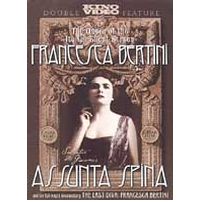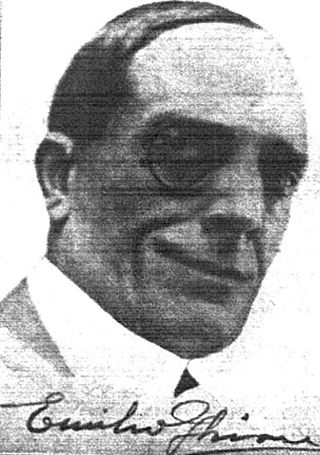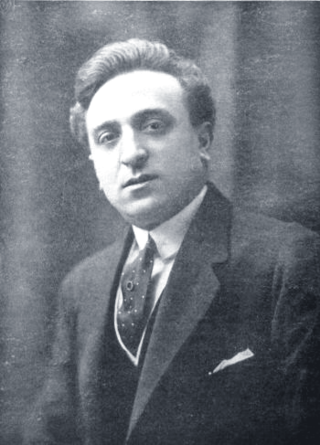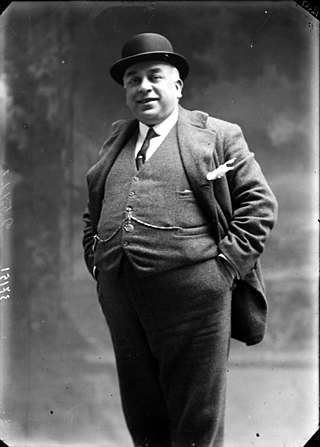
Eduardo De FilippoOMRI, also known simply as Eduardo, was an Italian actor, director, screenwriter and playwright, best known for his Neapolitan works Filumena Marturano and Napoli Milionaria. Considered one of the most important Italian artists of the 20th century, De Filippo was the author of many theatrical dramas staged and directed by himself first and later awarded and played outside Italy. For his artistic merits and contributions to Italian culture, he was named senatore a vita by the President of the Italian Republic Sandro Pertini.
The Lady of the Camellias, sometimes called Camille in English, is a novel by Alexandre Dumas fils. First published in 1848 and subsequently adapted by Dumas for the stage, the play premiered at the Théâtre du Vaudeville in Paris, France, on February 2, 1852. It was an instant success. Shortly thereafter, Italian composer Giuseppe Verdi set about putting the story to music in the 1853 opera La traviata, with female protagonist Marguerite Gautier renamed Violetta Valéry.

Francesca Bertini was an Italian silent film actress. She was one of the most successful silent film stars in the first quarter of the twentieth-century.

Assunta Spina is a 1915 Italian silent film. Outside Italy, it is sometimes known as Sangue Napolitano.

Assunta Spina is a 1948 Italian drama film directed by Mario Mattoli and starring Anna Magnani, Antonio Centa and Giacomo Furia. It was adapted from Salvatore Di Giacomo's 1909 play of the same title. It was released in the United States with the title Scarred. It was shot at the Farnesina Studios in Rome and on location in Naples. The film's sets were designed by the art director Piero Filippone. Distributed by Titanus it earned around 70 million lira at the domestic box office.
Assunta Spina may refer to:

Emilio Luigi Carlo Giuseppe Maria Ghione, known as Emilio Ghione, was an Italian silent film actor, director and screenwriter. Ghione was best known for writing, directing, and starring in the Za La Mort series of adventure films, in which Ghione played a likeable French Apache and 'honest outlaw'. Ghione directed, wrote, and acted in every genre of film, and directed some of the most famous stars of the time, including Francesca Bertini, Lina Cavalieri, Alberto Collo, and Hesperia. After his final film role in 1926, Ghione briefly performed on a theatrical tour of Italy. Ghione wrote three novels based around his Za La Mort character, an autobiography, and an essay on Italian Silent Cinema, before his death from tuberculosis in 1930.
Assunta Spina is a 1930 Italian silent drama film directed by Roberto Roberti and starring Rina De Liguoro and Febo Mari. It is based on the play of the same title by Salvatore Di Giacomo.

Giuseppe Barattolo (1882–1949) was an Italian lawyer, politician and film producer. In 1913, during the silent era, Barattolo founded Caesar Film. Caesar made a series of popular films, some of which starred Francesca Bertini. In 1919 he joined and became an influential figure at the conglomerate Unione Cinematografica Italiana which dominated Italian film production during the early 1920s, but this came to an end following the box office failure of Quo Vadis (1924). In the early 1930s he tried to re-establish Caesar Film as a serious force in Italian production, but this also failed.

Graziella is a 1954 Italian historical melodrama film directed by Giorgio Bianchi and starring Maria Fiore and Jean-Pierre Mocky. It is the third adaptation of the 1852 novel Graziella by Alphonse de Lamartine.
Odette is a 1934 Italian drama film based upon the play by Victorien Sardou, directed by Jacques Houssin and Giorgio Zambon and starring Francesca Bertini, Samson Fainsilber, Jacques Maury. Bertini had appeared in two previous versions of the story, the first a 1916 silent film Odette.

Odette is a 1928 German silent drama film based upon the play by Victorien Sardou, directed by Luitz-Morat, and starring Francesca Bertini, Warwick Ward, and Simone Vaudry. Bertini would star in two other adaptations of the play, Odette (1916) and Odette (1934).

Vincenzo Leone, known professionally as Roberto Roberti, was an Italian actor, screenwriter and film director. He made over sixty films, mostly during the silent era. He was married to the actress Bice Valerian. Their son Sergio Leone became a celebrated director.
Eugenia Grandet is a 1918 Italian silent historical drama film directed by Roberto Roberti and starring Francesca Bertini. It is based on the 1833 novel Eugénie Grandet by Honoré de Balzac.
The Fall of the Curtain is a 1920 Italian silent film directed by Roberto Roberti and starring Francesca Bertini.

The Cheerful Soul is a 1919 Italian silent comedy film directed by Roberto Roberti and starring Francesca Bertini. It is based on play by Serafín Álvarez Quintero.
Goffredo D'Andrea was an Italian film actor who appeared mainly during the silent era. He also worked occasionally as a screenwriter and film director.
Carlo Benetti (1885–1949) was an Italian film actor of the silent era. During the sound era he worked as production manager on a number of films.

Vera Vergani (1894–1989) was an Italian stage actress. She also starred in a number of silent films. She was the mother of the film producer Leo Pescarolo.

Gennaro Pantalena (1848–1915) was an Italian actor-manager and playwright. He developed a reputation as a character actor in Neapolitan theatre, appearing in the companies of Eduardo Scarpetta and Federico Stella. By 1888 he led his own company which took up residence in the city's Teatro Nuovo. He wrote several works in the Neapolitan dialect. In 1909 he directed and starred in Salvatore Di Giacomo's Assunta Spina.











